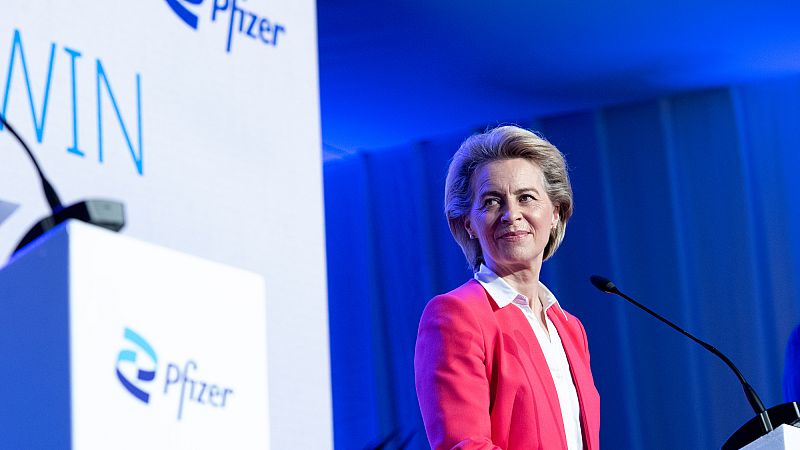Did pharma sector dodge Trump’s tariffs? The EU's not so sure

The pharmaceutical sector on both sides of the Atlantic appeared to have dodged Trump’s tariffs last night, as pharmaceutical products were among several categories exempted from reciprocal tariffs, according to a White House fact sheet. Copper, lumber, semiconductors and energy were among others' escaping the tariff guillotine.
The industry had been bracing for impact since February, when Trump suggested imposing 25% tariffs on medicines.
Among the most exposed EU countries to tariffs on pharmaceuticals is Ireland, where US companies such as Pfizer, Johnson & Johnson, Eli Lilly, Bristol-Myers Squibb, and AbbVie have recently shifted significant manufacturing operations.
Other key exporters of pharmaceuticals and biotech products include Denmark, Belgium, and Germany.
In 2024, pharmaceuticals were the top US import from the EU, totaling $127 billion (€117 billion), a trade flow that could have significantly impacted patients and businesses on both sides.
But despite the apparent life raft, the EU remains concerned about further tariff salvoes impacting exempted sectors.
“We would not be quite sure whether one could breath a sigh of relief,” one senior EU official said.
Tariffs on pharma still a possibility
The official noted that the US has identified five strategic areas for manufacturing and reshoring: automobiles, steel and aluminium, minerals and lumber, pharmaceuticals, and semiconductors.
The US has already imposed tariffs on cars, steel, and aluminium, while investigations have been launched into timber, wood, lumber, and copper.
“We believe there is a strong likelihood – we feel that was hinted at by the US - that investigations could be launched into the remaining two sectors [namely pharmaceuticals and semiconductors],” the official said.
To prepare for this possibility, European Commission president Ursula von der Leyen will convene pharmaceutical industry representatives on Tuesday next week in Brussels.
“We are not leaning back on pharmaceuticals. This is a strategic sector for Europe, and we will do everything to protect and promote it,” the official added.
Pharmaceuticals represent a sector with extensive bilateral trade. “We provide inputs into each other’s industries,” the official said, pointing out that the trade relationship involves highly specialised products shared across both regions.
A problem created by Trump
The current US reliance on EU pharmaceutical exports and active ingredients is partly the result of Trump’s own policies back in 2017.
A Senate Finance Committee investigation, released in March by Democrats, found that major US pharmaceutical companies exploited a loophole created by Trump’s 2017 tax overhaul to shift profits offshore.
Companies like Pfizer, AbbVie, Johnson & Johnson, Bristol-Myers Squibb, and Merck & Co. have used low-tax havens such as Ireland to minimise their US tax bills. As a result, Ireland has become a major hub for US pharmaceutical manufacturing.
“Should tariffs be applied in the future, this could have a significant economic impact on Ireland, where the pharmaceutical industry employs approximately 45,000 people and exports to the US are valued at over €72 billion,” said Billy Melo Araujo, professor of law at Queen’s University Belfast.
The Irish Pharmaceutical Healthcare Association (IPHA) believes the real impact of the dispute between the White House and the EU will only be felt “four or five years from now”, due to the long-term nature of investment in large-scale manufacturing plants.
Belgium, home to major Pfizer production facilities in Europe, exported over $73 billion in pharmaceuticals in the first 10 months of 2024, with 24% of that going to the US. The pharmaceutical industry accounts for 15% of Belgium’s total exports.
“Our first reaction is one of relief. That said, we remain very vigilant and concerned about the future,” said David Gering from Pharma.be.
He added that the American market represents a significant portion of Belgium’s pharmaceutical sector, making it highly sensitive to changes in US trade policies.
Today

